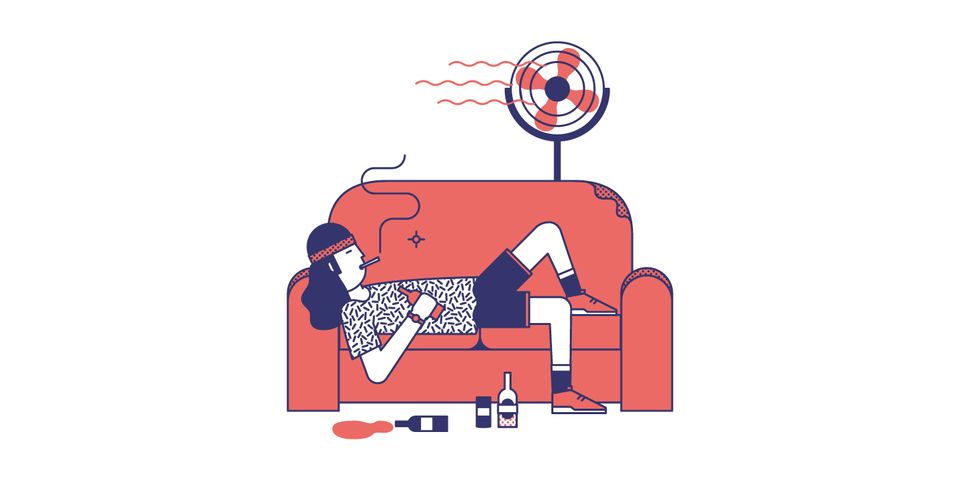The Psychology of Change: How to Break Free from Bad Habits!

Bad habits. We all have them, and they seem to have a sneaky way of derailing our lives and hindering our progress.
They compromise our well-being, both mentally and physically, and waste our precious time and energy.
So, why do we continue to indulge in them?
And more importantly, is there anything we can do about it? Let's dive into the practice of breaking bad habits and replacing them with good ones.
First things first, let's understand what causes bad habits.
Most of the time, they stem from two culprits: stress and boredom.
That's right, those pesky habits often serve as coping mechanisms for dealing with these unpleasant feelings. Whether it's nail-biting, overspending, weekend drinking, or mindlessly scrolling through the internet, these habits are often our go-to responses when we're stressed or bored.
But fear not! You can teach yourself healthier ways to manage stress and boredom, thereby substituting them for your bad habits. Of course, sometimes these surface-level stressors are rooted in deeper issues.
It can be challenging, but to make lasting changes, it's essential to be honest with yourself. Take a moment to reflect: Are there underlying beliefs or reasons fueling your bad habits? Is there something deeper, like a fear, an event, or a limiting belief, that's causing you to cling onto something that's ultimately harmful?
Here are five questions that can help you delve deeper into your bad habits:
- What purpose does this bad habit serve in my life? What need or benefit does it fulfill?
- Am I using this habit as a coping mechanism for stress, boredom, or other emotions? If so, what healthier alternatives can I explore?
- Are there any underlying fears or limiting beliefs that are contributing to my attachment to this bad habit?
- Have there been any significant events or experiences in my life that may have influenced the development of this habit?
- How is this bad habit hindering my overall well-being and progress towards my goals?
By honestly reflecting on these questions, readers can gain valuable insights into the deeper roots of their bad habits and begin to address them effectively.
Recognizing the root causes of your bad habits is crucial to overcoming them.

Now, here's an important mindset shift: You don't simply eliminate a bad habit; you replace it.
Every habit you currently have, whether good or bad, serves a purpose in your life. Even if they're detrimental in some ways, they fulfill a need or provide some form of benefit.
It could be a biological benefit like the feeling you get from smoking or doing drugs. Or perhaps it's an emotional benefit, like staying in a toxic relationship. In many cases, bad habits serve as quick fixes for stress relief, such as nail-biting, hair-pulling, foot-tapping, or jaw-clenching.
Even the smaller bad habits offer some sort of benefit. For instance, immediately checking your email when you turn on your computer might make you feel connected, but it also hinders productivity, divides your attention, and overwhelms you with stress. Yet, the fear of missing out keeps you trapped in the cycle.
Because bad habits provide a perceived benefit, simply eliminating them becomes incredibly difficult (despite what some simplistic advice may suggest). Instead, you need to replace a bad habit with a new one that offers a similar benefit.
Let's say you smoke when you're stressed. Rather than abruptly quitting smoking, it's more effective to develop alternative stress-management strategies and replace smoking with a healthier coping mechanism.
In other words, bad habits fulfill specific needs in your life. Therefore, it's crucial to replace them with healthier behaviors that address those same needs. Expecting yourself to eliminate bad habits without providing alternative solutions will leave you with unmet needs, making it challenging to sustain a routine of "just don't do it."
Now that we understand the mechanics of breaking bad habits, here are some additional ideas to help you in this transformative process:
- Choose a substitute for your bad habit: Prepare a plan for how you'll respond when faced with the stress or boredom that triggers your bad habit. Whether it's deep breathing exercises instead of smoking or writing one sentence for work instead of succumbing to the allure of Facebook, having a clear alternative in mind will empower you to make better choices.
- Minimize triggers: Identify the situations or environments that typically lead to your bad habits and eliminate or avoid them as much as possible. If you smoke when you drink, consider abstaining from alcohol. If you can't resist cookies in the house, bid them farewell. By altering your environment, you make it easier to break bad habits and cultivate good ones.
- Team up with a buddy: Attempting to change habits in isolation can be challenging. Find a like-minded individual who shares your desire to break bad habits and work together. Holding each other accountable and celebrating victories together adds a powerful motivator to your journey.
- Surround yourself with positive influences: Seek out individuals who exemplify the lifestyle you aspire to achieve. Your old friends don't need to be cast aside, but don't underestimate the impact of new connections that align with your goals.
- Visualize success: Take a moment to imagine yourself triumphing over your bad habit. Visualize tossing away those cigarettes, buying healthy groceries, or waking up early feeling refreshed. By envisioning yourself embracing positive change and enjoying the rewards, you set the stage for success.
- You don't need to be someone else; you need to return to the old you: Breaking bad habits doesn't mean becoming an entirely new person. Remember, you've lived without these habits before. You don't need to quit smoking; you need to be a non-smoker again. You don't need to transform into a healthy person; you need to return to being healthy. You already possess the capability to break free from these bad habits.
- Use the word "but" to overcome negative self-talk: It's easy to fall into self-judgment when battling bad habits. Instead of dwelling on your mistakes, finish negative thoughts with the word "but." For example, "I'm fat and out of shape, but I could be in shape a few months from now." By acknowledging setbacks but redirecting your focus to potential progress, you cultivate a growth mindset.
- Plan for failure: Mistakes happen, and slips are a part of the journey. Remember that making a mistake doesn't make you a failure; it makes you human. Anticipate setbacks and have strategies in place to bounce back quickly. The ability to course-correct is what sets top performers apart.
Where do you go from here?

If you're ready to break bad habits, start by cultivating awareness. It's easy to get caught up in how you feel about your habits, but true change comes from understanding what's happening in the present moment.
Pay attention to when your bad habits occur, how frequently they happen, the environments you're in, and the triggers that initiate them. Simply tracking these details will increase your awareness and provide valuable insights into how you can interrupt the cycle.
Start by carrying a small notepad and a pen. Each time you catch yourself engaging in a bad habit, make a tally mark. At the end of the day, count up the marks and assess the frequency. This exercise isn't about judgment or guilt; it's about becoming conscious of the behavior and gathering information to break free from it.
Most people experience multiple attempts and failures before successfully overcoming their bad habits.
Remember, immediate success isn't always the norm, but that doesn't mean it's unattainable.
So, take the first step: be aware.
From there, implement the strategies discussed in this article and start replacing your bad habits with positive, life-enhancing alternatives. Embrace the process, learn from your experiences, and never lose sight of the fact that you have the power to break free and thrive.
Stay tuned for more insights on Just Thrive as we journey together toward a better, healthier, and more fulfilling life.